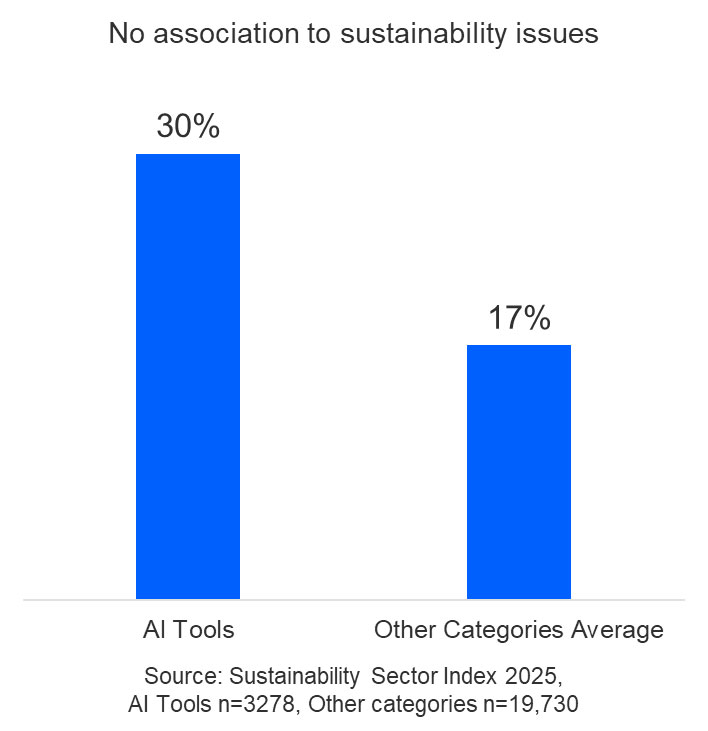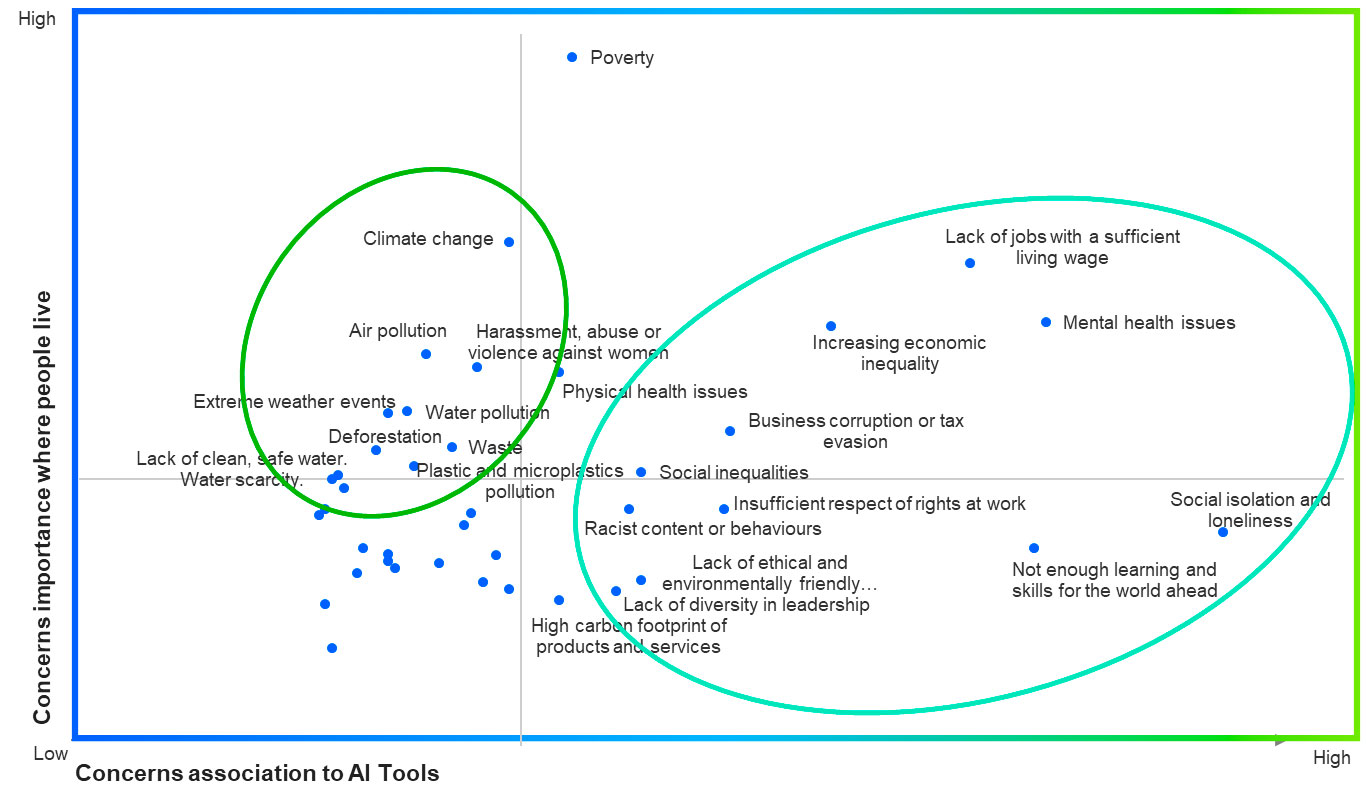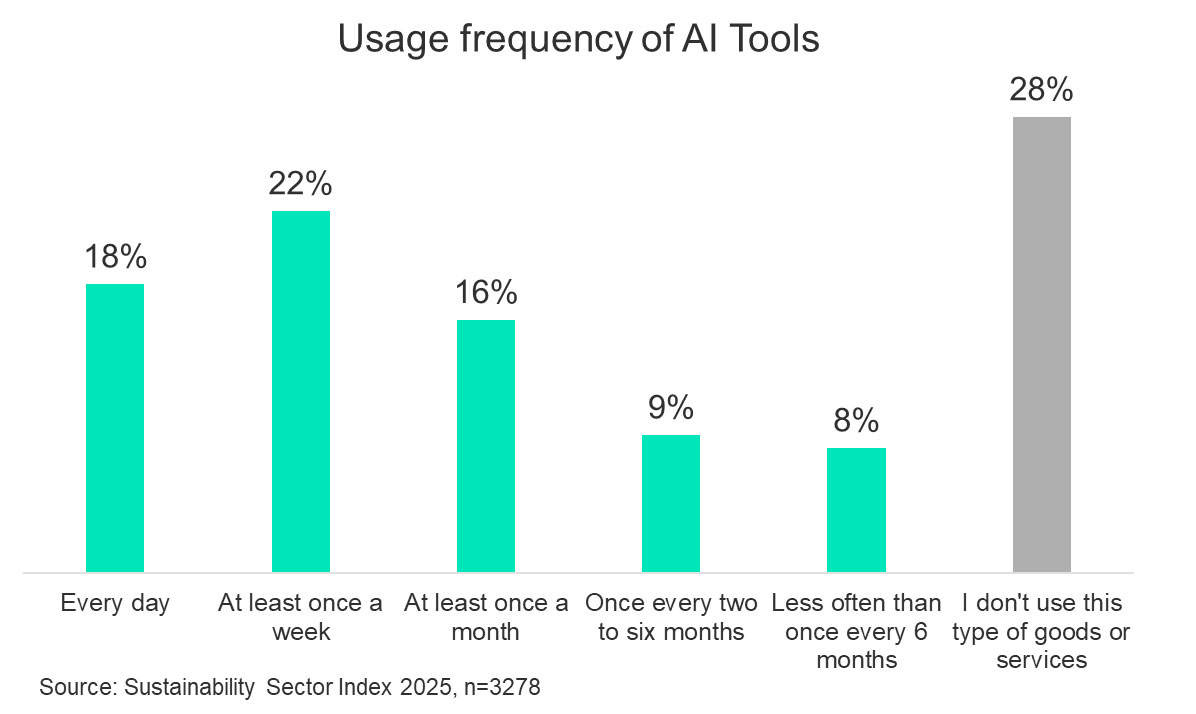AI in the public eye: A black box of concerns
As AI tools become more embedded in everyday life from chatbots to creative assistants, a new question is emerging: what do people actually think about the sustainability impacts of AI?

According to the Sustainability Sector Index 2025, AI tools rank among the least understood sectors when it comes to sustainability. A high 30% of people globally can’t name a single sustainability issue connected with AI, with that number rising to 47% in the Netherlands, 43% in Romania, 39% in Japan, and 38% in the UK and Germany. But this isn’t apathy, it’s opacity. AI is still a black box for many, and its environmental and social impacts are largely invisible to the average consumer.
On the flip side, that’s still 70% of people globally who can name at least one sustainability concern related to AI, and on average, they cite four. The top concerns? Not carbon emissions or climate change, but social and economic issues:
- Social isolation and loneliness
- Mental health impacts
- Not enough learning and skills for the world ahead
- Lack of jobs with a sufficient living wage
- Increasing economic inequality
- Business corruption or tax evasion
- Insufficient respect of rights at work
- Lack of ethical and environmentally friendly business operations
- Social inequalities
- Racist content or behaviours
And when we ask about what issues are important to people, three of the top ten issues raised in connection to AI hold high importance: ‘Lack of jobs with a sufficient living wage’, ‘Mental health issues’ and ‘increasing economic inequality’ are amongst the top ten general concerns that people and believe should be addressed.
Additionally, it’s worth noting that AI tools have the strongest association to ‘social isolation and loneliness’ as well as ‘Not enough learning and skills for the world ahead’ out of the 42 sectors covered in our study – making these particularly distinctive issues about AI in peoples’ minds.

This map is a Sustainability Sector Index strategic ‘Swords & Shields” topic analysis for AI tools. It projects on the vertical axis what people care about in general and on the horizontal axis what they associate with AI tools specifically. A critical insight here is that the topics associated with AI tools are mostly social and societal topics (circled on the right side) whereas environmental topics aren’t strongly associated (circled on the left side).
The concerns people raised paint a picture of a public that sees AI not just as a technological shift, but as a social disruptor. And yet, there’s a twist: people are surprisingly hopeful about AI’s potential to help solve environmental challenges.
Hope for the climate, fear for society
While social and economic anxieties dominate consumers’ perspective on AI, there’s a clear thread of optimism. Consumers believe AI could offer meaningful solutions to environmental issues, from reducing emissions to improving efficiency. In fact, AI tools outperform many other sectors in perceived potential to drive environmental progress, with a positive index score of 78 (on a scale from -100 to +100).
AI also scores well on pollution and low deforestation/biodiversity degradation perceptions. It is among the least associated with greenwashing — though this is likely due to the current lack of visibility rather than active trust.
That’s a strong foundation for brands to build on if they’re willing to lead with transparency and purpose.
The usage paradox: High adoption, low awareness
In 2025, AI is no longer niche. It’s mainstream, and so are the headlines about its impact. From Amazon’s robot workforce nearing parity with its human staff, to AI reshaping internships and entry-level jobs, to Google’s bet on nuclear fusion to power AI data centers, the public is being exposed to a complex narrative. AI is both the innovator and the disruptor. The solution and the threat.
Globally, 40% of people say they are regular users of AI tools, not just generative AI, but across a wide range of applications. Yet despite this high usage, AI ranks lowest among 42 sectors in terms of sustainability awareness.

This disconnect is reflected in whether or not people factor in sustainability as a criteria when choosing an AI tool. 63% of current users globally say they would be open to trying or adopting sustainability positive AI tools but, at the moment, the issue has little impact on their decision making.
Why? The top barrier cited isn’t price as it usually is. It’s lack of information. Over 27% of people say they don’t have enough information to make sustainable choices about AI tools. Others cite unfamiliarity (19%), lack of alternatives at (19%), or mention that it feels impossible to find out what environmental or social impact these tools have (18%).
What’s missing from this conversation is clarity. Unlike sectors like food or fashion, where people have a better grasp of the environmental and social factors, with more visible causes and impacts, AI tools are still too new, too opaque, and too hard to compare. People are open to choosing more sustainable AI tools, they just don’t know which ones those are.
The brand imperative: Lead with people, not just product
For brands, this is a moment of opportunity. If you’re integrating AI into your services - whether through customer support, personalisation, or content - you have a chance to lead. Not just in functionality, but in ethics, transparency, and environmental responsibility.
Consumers are already primed to believe that AI can offer meaningful solutions to environmental issues. In fact, AI tools outperform many other sectors in this perception. But to turn that optimism into action, brands need to activate and differentiate, not just adopt.
And for direct-to-consumer AI platforms, there is a door open for showcasing a new kind of AI, one built with sustainability in mind: low-carbon, ethically trained, inclusive by design, and transparent in operation.
In a world where platforms multiply and AI becomes commoditised, the differentiator won’t be speed or scale, it will be trust.
A call to innovate: Can AI be a force for good?
The data is clear: people are concerned about the social fallout of AI, but they’re hopeful about its climate potential. That’s a powerful insight and a call to action.
For brands, the path forward is not just about adopting AI, but about shaping it. Making it understandable. Making it ethical. Making it sustainable.
Because in the end, the future of AI won’t just be written in code, it will be shaped by what people believe it can (and should) do.
This article was written using our latest edition of the Sustainability Sector Index 2025 - an unparalleled toolkit to diagnose how people perceive and engage with your sector and how you can build more leadership in relation to environmental and social concerns.
Do you wonder, what’s your next best steps for your brand on sustainability? And how to unlock the commercial power of this demand?
We can help:
- Identify the reshaping consumer dynamics in your sector
- Unpack cultural shifts for relevant global/local activations
- Measure how your brand’s perception on sustainability influences your equity
- Shape your path to brand building through sustainability
- Test your executions to remove risks and ensure success

